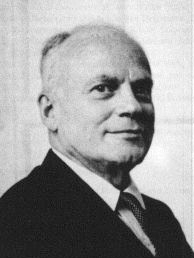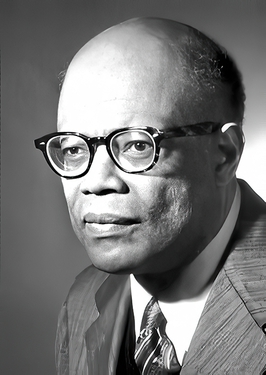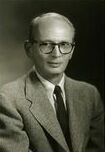Related Research Articles
Development economics is a branch of economics that deals with economic aspects of the development process in low- and middle- income countries. Its focus is not only on methods of promoting economic development, economic growth and structural change but also on improving the potential for the mass of the population, for example, through health, education and workplace conditions, whether through public or private channels.

Simon Smith Kuznets was a Russian-born American economist and statistician who received the 1971 Nobel Memorial Prize in Economic Sciences "for his empirically founded interpretation of economic growth which has led to new and deepened insight into the economic and social structure and process of development."

Jacob Viner was a Canadian economist and is considered with Frank Knight and Henry Simons to be one of the "inspiring" mentors of the early Chicago school of economics in the 1930s: he was one of the leading figures of the Chicago faculty. Paul Samuelson named Viner as one of the several "American saints in economics" born after 1860. He was an important figure in the field of political economy.

Sir William Arthur Lewis was a Saint Lucian economist and the James Madison Professor of Political Economy at Princeton University. Lewis was known for his contributions in the field of economic development. In 1979, he was awarded the Nobel Memorial Prize in Economic Sciences.

Salomon Bochner was a Galizien-born mathematician, known for work in mathematical analysis, probability theory and differential geometry.

Fritz Machlup was an Austrian-American economist known for his work in information economics. He was President of the International Economic Association from 1971 to 1974. He was one of the first economists to examine knowledge as an economic resource, and is credited with popularising the concept of the information society.

Albert Otto Hirschman was a German economist and the author of several books on political economy and political ideology. His first major contribution was in the area of development economics. Here he emphasized the need for unbalanced growth. He argued that disequilibria should be encouraged to stimulate growth and help mobilize resources, because developing countries are short of decision-making skills. Key to this was encouraging industries with many linkages to other firms.
The Institute of Pacific Relations (IPR) was an international NGO established in 1925 to provide a forum for discussion of problems and relations between nations of the Pacific Rim. The International Secretariat, the center of most IPR activity over the years, consisted of professional staff members who recommended policy to the Pacific Council and administered the international program. The various national councils were responsible for national, regional and local programming. Most participants were members of the business and academic communities in their respective countries. Funding came largely from businesses and philanthropies, especially the Rockefeller Foundation. IPR international headquarters were in Honolulu until the early 1930s when they were moved to New York and the American Council emerged as the dominant national council.
Rupert Emerson was a professor of political science and international relations. He served on the faculty of Harvard University for forty-three years and served in various U.S government positions.
Kingsley Davis was an internationally recognized American sociologist and demographer. He was identified by the American Philosophical Society as one of the most outstanding social scientists of the twentieth century, and was a Hoover Institution senior research fellow.

Helen Dolly Hughes was an Australian economist. She was Professor Emerita at the Australian National University, Canberra, and Senior Fellow at the Centre for Independent Studies, Sydney. Hughes has been described as Australia's greatest female economist.
John Whitney Hall was an American historian of Japan who specialized in premodern Japanese history. His life work was recognized by the Japanese government, which awarded him the Order of the Sacred Treasure.

Earle L. Reynolds was an anthropologist, educator, author, Quaker, and peace activist. He was sent to Hiroshima by the Atomic Energy Commission in 1951 to study the effects of the first atomic bomb on the growth and development of exposed children. His professional discoveries concerning the dangers of radiation later moved Reynolds into a life of anti-nuclear activism. In 1958 he sailed with his wife Barbara, two of his three children and a Japanese yachtsman in the Phoenix of Hiroshima, a ketch he had designed himself, into the American nuclear testing zone in the Pacific. In 1961 the family sailed to the USSR to protest Soviet nuclear testing. During the Vietnam War Reynolds and his second wife, Akie sailed the Phoenix to Haiphong to deliver humanitarian and medical aid to victims of American bombing.
Richard T. McCormack is an American government official and diplomat. He has served nearly five decades advising policymakers on foreign affairs and global economic developments. He is currently a senior advisor for CSIS in Washington, D.C.
John Bell Condliffe was a New Zealand economist, university professor and economic consultant. Lauded for the decisive role he played in international NGOs in the interwar period, he was one of New Zealand's best-known international economists.
Kent E. Calder was the interim dean of the Johns Hopkins School of Advanced International Studies (SAIS), serves as the director of the Edwin O. Reischauer Center for East Asian Studies, and is also the Edwin O. Reischauer Professor of East Asian Studies at SAIS. Calder previously served as the vice dean for faculty affairs and international research cooperation at SAIS.
The bibliography covers the main scholarly books, and a few articles, dealing with the History of Japan
Thomas Arthur Bisson, who wrote as T. A. Bisson was an American political writer, journalist, and government official who specialized in East Asian politics and economics.
Stephan Haggard is the Lawrence and Sallye Krause Professor of Korea-Pacific Studies at the School of Global Policy and Strategy and distinguished professor of political scientist specializing in comparative politics at the University of California San Diego. He received his Ph.D. from the University of California Berkeley (1983) and taught in the Government Department at Harvard (1983-1992) before joining the faculty at UC San Diego. He teaches courses on international political economy, the international relations of the Asia-Pacific and qualitative methods. He is currently the editor of the Journal of East Asian Studies, a journal devoted to publishing innovative social science research on the region.
Foster Rhea Dulles was an American journalist and historian, and author of a number of books. He specialized in political and cultural relations between the United States and East Asia, and advocated internationalism as opposed to American isolationism. The diplomats John Foster Dulles and Allen Dulles were his cousins.
References
- ↑ Thirlwall, A. P. (2011) Economics of Development, Palgrave
- ↑ Allen, G. C.,(1955). Review of The Economic Development of Japan. Growth and Structural Change, 1868–1938, by Lockwood, W. W. Pacific Affairs, June, 28, 2, 171–173.
- ↑ Princeton University:The William W. Lockwood Papers
- ↑ "William W. Lockwood Papers - Philadelphia Area Archives".
- ↑ Cohen, J. B.,(1955). Review of The Economic Development of Japan by Lockwood, W. W. The American Economic Review, June 45, 3, 409–411.
- ↑ Hoselitz, B. F.,(1956). Review of The Economic Development of Japan by Lockwood, W. W. . American Journal of Sociology, January, 61, 4, 389–390.
- ↑ Reubens, E. P., (1955). Review of The Economic Development of Japan: Growth and Structural Change, 1868–1938. by Lockwood, W. W. Political Science Quarterly, December, 70, 4, 630–632.